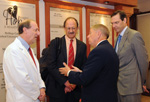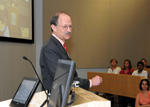|
Two influential policy makers
visited MUSC's Hollings Cancer
Center extolling the importance of
maintaining funding for cancer
research given looming
governmental cutbacks.
Sen. Lindsey
Graham and Harold Varmus, M.D.,
director of the National Cancer
Institute (NCI) and co-recipient
of a Nobel Prize for studies of
the genetic basis of cancer, met
with press and health care
professionals at Hollings Cancer
Center (HCC) June 4. Varmus
addressed a standing–room–only
crowd for a special seminar held
at the Bioengineering Building
explaining the new themes at NCI
of precision medicine, global
health and provocative questions.
 Sen. Lindsey Graham
(R-SC), front, meets with Drs.
Andrew S. Kraft, left, Harold
Varmus and Ray Greenberg June 4. Sen. Lindsey Graham
(R-SC), front, meets with Drs.
Andrew S. Kraft, left, Harold
Varmus and Ray Greenberg June 4.
Lindsey, who
offered statements to the press
before Varmus' presentation, said
that South Carolina has
disproportionately high rates of
some types of cancer and needs to
do what it can to ensure that
Holling's Cancer Center maintains
its research funding. NCI faces a
possible funding decrease of 8.5
percent, a drop that Graham
described as political
malpractice.
The center
currently receives $1 million from
the institute's $5 billion annual
budget that is set to be trimmed.
"For $5
billion, we're making dramatic
strides against cancer across the
board," Graham said. "The idea of
cutting that 8.5 percent makes no
sense to me. The amount of money
coming into the Holling's Cancer
Center has phenomenally increased
the ability of people to survive
cancer episodes in South Carolina.
If government isn't about saving
lives and improving the quality of
life, what is it about?"
Varmus said he
was impressed that HCC was able to
get the status of being an
NCI–designated cancer center, one
of 66 nationally, in 2009. "We at
the NCI value our cancer centers
very highly. When they pass the
scrutiny of our peer reviewers and
win the designated status, we know
they are strong. We like having
cancer centers spread throughout
the country and not just in New
York, San Francisco and Boston.
We're very pleased to find here in
South Carolina, you have a strong
center."
In his
presentation, Varmus covered some
of the exciting changes happening
in cancer research.
"We're seeing
in some types of cancer
revolutionary changes in the way
we diagnose and treat the disease
and new ways to prevent it and to
screen for it. We've gone from a
time when cancer was a complete
mystery to a time now just 20 or
30 years later when we understand
exactly the type of changes that
occur in our chromosomes that turn
a normal cell into a cancer cell.
That's had profound implications
for prevention, diagnosis and
treatment."
Covering the
NCI's provocative questions
project, Varmus shared with
researchers and clinicians some of
the questions driving the
frontiers in cancer research. (For
information, visit
http://provocativequestions.nci.nih.gov/.)
Given recent technological
advances, especially in genomics,
molecular biology, and
computational sciences, there has
never been a better time for doing
cancer research, he said.
"We have made
large leaps in our basic knowledge
about cancers — especially about
the genetic and biochemical
mechanisms by which they arise."
Andrew S.
Kraft, M.D., HCC director, said he
was pleased by the visit during
what is a challenging fiscal
environment. Cancer centers grow
based on the commitment of state
leaders to have an outstanding
one.
"In South
Carolina, where rates for some
cancers are among the highest in
the nation, increased funding
means we can intervene in cancer
earlier — from preventing and
controlling it to diagnosing it
earlier and developing better
therapies to treat it."
Cancer is set
in a few years to overtake heart
disease as the leading killer of
Americans, Kraft said.
"Further cuts
to the NCI would be passed down to
us and our research programs.
Cancer research here and other
places would be set back at a time
when we need to be more aggressive
than ever in exploiting what we've
learned about this complex disease
and investing in people and
technology to slow it down."
In the
meantime, Varmus' special seminar
had MUSC medical professionals
discussing the issues.
 NCI Director Harold
Varmus addresses a packed house
June 4 for his special seminar
on new themes at the NCI. NCI Director Harold
Varmus addresses a packed house
June 4 for his special seminar
on new themes at the NCI.
Research
specialist Deirdre Walker, who
attended the seminar, said she
enjoyed the provocative questions
project and the overview of the
advances in the field. "There were
a lot of things worth thinking
about," she said, noting the
disparities in cancer rates based
on variables such as geography and
gender. "It was very worthwhile.
It changes the way you look at
things."
|



 Sen. Lindsey Graham
(R-SC), front, meets with Drs.
Andrew S. Kraft, left, Harold
Varmus and Ray Greenberg June 4.
Sen. Lindsey Graham
(R-SC), front, meets with Drs.
Andrew S. Kraft, left, Harold
Varmus and Ray Greenberg June 4. NCI Director Harold
Varmus addresses a packed house
June 4 for his special seminar
on new themes at the NCI.
NCI Director Harold
Varmus addresses a packed house
June 4 for his special seminar
on new themes at the NCI.